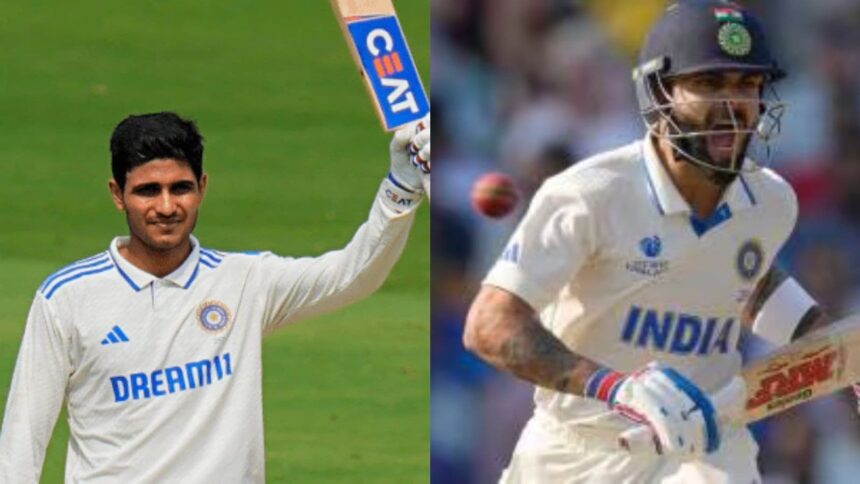The narrative arc of was pre-scripted even before he faced the first ball in international cricket. He was the chosen one the moment he made heads turn in the age-group circuit; the best player in a victorious Under-19 World Cup, the inheritor of the country’s batting heritage and a future leader. His career, ignited on the farms of his father in the border village of Chak Kherewala in Punjab’s Fazilka district, has largely stuck to the plot, and on Saturday, he completed another natural rung. He became the captain of his country’s Test team, in both tricky and testing circumstances.
He was an idealistic rather than pragmatic choice, a shot at the future rather than one of immediate gain. With the departure of , and , India were left with a group of cricketers drifting into the horizon, or those that were too callow, or good leaders but uncertain team-members.
The circumstances are somewhat similar, though not exact, to the times Kohli assumed the throne, a leadership vacuum as well as a crisis, forced by the phasing out of seniors, the sudden retirement of the incumbent skipper MS Dhoni, dearth of alternatives in a transitioning group, and India wading through a rough patch in this format. It’s almost like a sequel, the old template with a few tweaks.
Both Kohli and Gill were in a similar juncture of their career when they took over the reins. Kohli was a month past his 26th birthday when led India for the first time in a Test. Gill is merely three months from turning 26. Kohli, 51-Test-old with an unflattering average of 39.46, had not yet established himself as the foremost batsman of his times, the concept of a fab four was not vague, but inexistent. He had experienced the worst series of his career a few months ago in England that instigated talks of an existential crisis.
Comparably, Gill has not yet soared into the batting glitterati of his era. In 59 outings, he averages a modest 35.05 with five hundreds, one fewer than Kohli at this stage. Like the horrors Kohli encountered in England, Gill fell on hard times in Australia, mustering 93 runs in five innings. But there is an overriding belief, as it was during Kohli’s nascent years, that one day he would evolve into the batting elite he was touted to be. He spent a brief time outside the team too, and had doubters hounding on his technique. But he, like Kohli, had always found the wherewithal to reinvent.
The thematic familiarity ends there.
From his first stride on the international ring, Kohli exhibited the bearings of a future commander. Kohli was a captain even before he became one. The gaze of senior luminaries, some of them all-time greats, did not inhibit him from being himself, expressive, emotional, loud and sometimes petulant. He did not bother if he was given his space, he took his own space. Captaincy was the most natural step in his career, and in the end the most defining one too.
It was different with Gill. As much as he was destined to be one, he had not always shown the traits on the field. He is such a withdrawn member on the field that he goes unnoticed unless the ball reaches him. Him being touted as future captain owed to him being the best batsman of his time rather than the irresistible on-field persona. A natural progression of a reasonable successful career rather than someone born to shepherd the flock.
He was something of a project-captain, like project players. Someone diligently groomed into the role. Handing over vice-captaincy duties in ODI was the first step in this direction. It was not a blind trial or audition, but a concerted move in the making of Gill the captain. Perhaps, he would have preferred a longer internship so that he is utterly ready to take over the job that’s considered the second most important one in the country after the Prime Ministers. But one day or the other, his destiny would have caught up with him.
He is cut from a different cloth from Kohli. The latter screamed of his West forebears in every stride he broke. The village that raised him is nearer to Multan (250km) than New Delhi (400km). He grew up in the sprawling farm, where his father’s farmhands rolled out a pitch where he batted for hours. Affluence though did not make him lazy. From the age of three, he devoted himself to countless hours of practice, with the dream of playing for his country burning in him. In his adolescence, he shifted to Mohali for better exposure and coaching. Staying away from parents and adjusting to the hustle of nearby were difficult, but he would sacrifice anything to fulfil his dream. And the lines of destiny that always shadowed him.
In traits on the field, he is closer to the older generation of and VVS Laxman. He breathes a quiet, disarming confidence. The facial features — placid eyes, stubble-less face, orderly hair, choirboy smile — exaggerate the sense of peace he exudes. An angry Gill is an oxymoron. Century celebrations are an exercise in restraint. In almost every picture of him, he is just warmly smiling, pouring ounces of boy-next-door charm. In interviews, he is intense yet calm. His words are stilted yet measured, divulging only what is meant to be; his gestures are self-conscious but not nervous. He is unafraid to voice his opinions, as he did during the farmers’ protests, but in a dignified tone. Importantly, he does not try to be who he is not.
How all the traits combine and complement his days at the helm would make a fascinating watch. Alas, there is no time-travelling machine into the future. But only thing is certain — he loathes to fail. An integral part of his destiny-charting is that he has rarely failed in making transitions. Not always had he made it look smooth, but the fierceness to succeed rages in him and overcomes the bumps en route. The burdens would be many — he has to ensure his batting does not suffer, the extra responsibility does not become a millstone around his neck. He may still have to learn about how to do the job, but he has one thing he most needs: a lot of heart. This trait unifies Gill and Kohli again, like the invisible and knotted threads of destiny.









